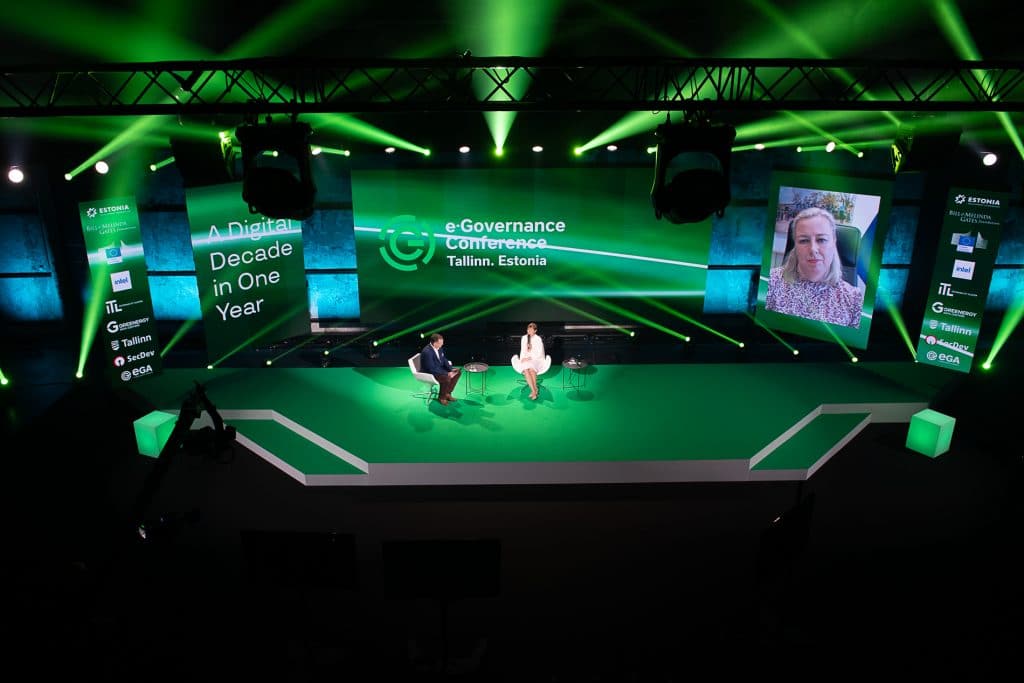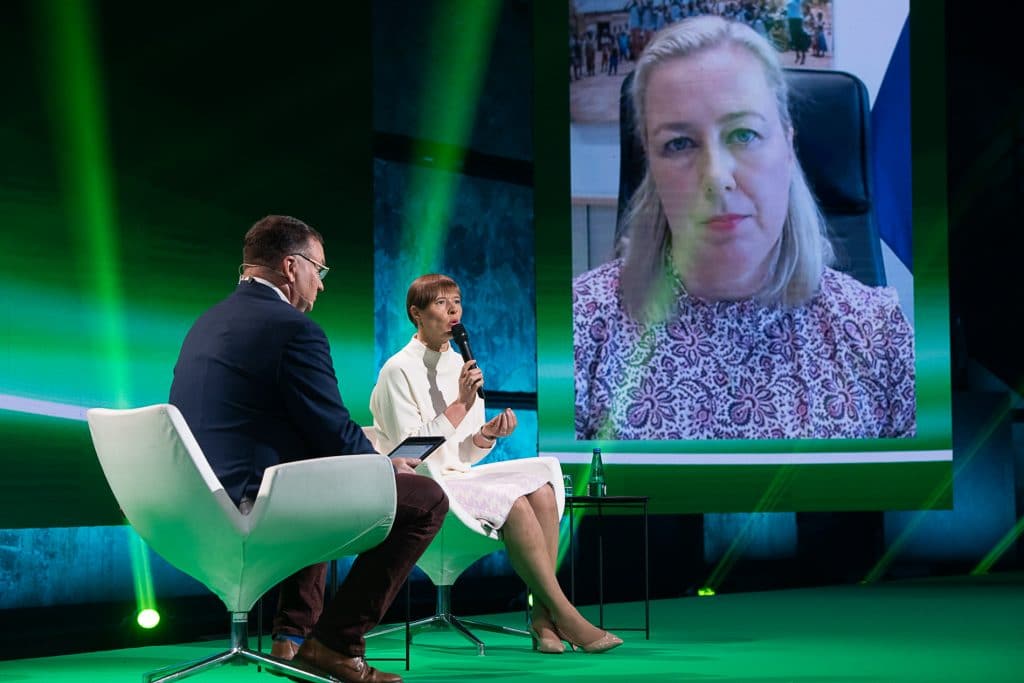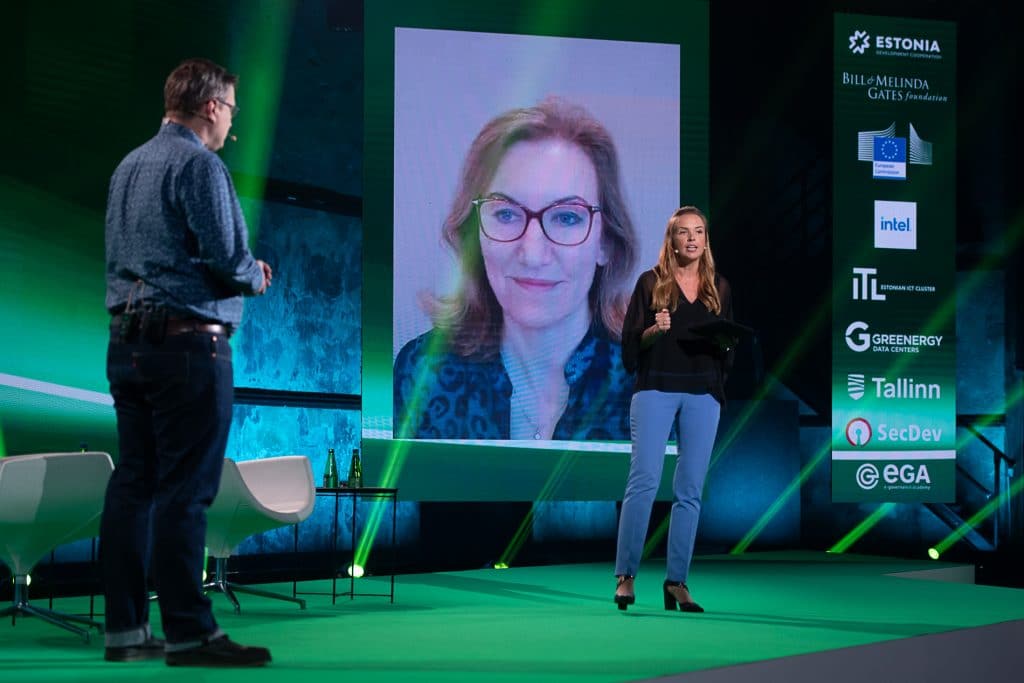Day 2: Lessons learned of the New Normal
The second day of the 7th e-Governance Conference saw a record-breaking number of participants. With over 1200 registered online attendees from 140 countries, the Conference has become the most global event dedicated to digital transformation of governments. Thank you to everyone who helped make this happen!
After an introductory overview of e-governance building blocks in Day 1, the second day of the Conference took a deep-dive into the new normality resulting from the pandemic. The participating expert speakers reflected on the accelerated digitalisation that has taken place worldwide and called attention to critical considerations around security, equality, and resources.
The highlights from Day 2 summarise key observations – ranging from issues around digital divides and ICT literacy – and feature insights from Kersti Kaljulaid, Jutta Urpilainen, Takuya Hirai, Kristo Vaher and Ralph Oyini Mbouna among others. In addition, we cover some of the country experiences shared by high-level government representatives from Ukraine, Japan, the Smart Africa initiative and many more.
Rewatch the conferene here

Embedding trust and equality in future systems
Reflecting on the past year, President Kersti Kaljulaid recognised the impressive digital strides countries have taken in response to the pandemic. While encouraging leaders to be proud of these achievements, Kaljulaid also highlighted the importance of revisiting the systems that have been built. In many countries, the accelerated crisis response saw the rapid introduction of new solutions without building a proper digital foundation. To ensure sustainability, security, and reliability, Kaljulaid underlined the need for continuous verification of all digital systems in the context of the new normality.
The pandemic accentuated numerous pre-existing issues and placed them under a new light. With the greater reliance on technology, global digital divides were brought to the forefront. Jutta Urpilainen, European Commissioner for International Partnerships, called attention to how the digital divide further translates into a rural-urban divide, an economic divide, and a gender divide. In response, Urpilainen emphasised the utility of the EU’s development cooperation funding and that fair digitalisation is one of EU’s key priorities going forward.

But on top of broader policies, technology needs to be leveraged to respond to these challenges. Ruth Goodwin-Groen, Managing Director at the Better Than Cash Alliance, shared how Colombia and Bangladesh have developed their digital payment infrastructure to tackle issues such as rising gendered inequality, poverty, and loss of employment during the pandemic. The efforts of these countries, and many others, were all pursued through diverse public-private partnership models and empowered by a digital mindset.
Making transformative digital leaps during the COVID-19 crisis
The sessions throughout Day 2 shed light on many other digital initiatives across continents – from the introduction of innovative tools to the empowerment of digital leadership. Takuya Hirai, Minister for Digital Transformation of Japan, shared his country’s plans to create a Digital Agency, which will take the lead in building Japan’s digital society. Minister Hirai noted that the past year has illustrated how quickly meaningful digital change can be achieved.
High-level representatives from Mongolia and Kyrgyzstan echoed the accelerated development caused by the crisis. The public sector in both countries introduced a range of new solutions to advance e-governance and help society cope with the pandemic. Leaders in both countries saw hesitation from society when it came to the initial adoption of new tools. But slowly, when citizens experienced the real-life benefits of these tools, strong societal enthusiasm was ignited for further digitalisation.

In parallel with the rapid digital advancements, most speakers brought forward the increasing importance of ICT literacy. Valeriya Ionan, Deputy Minister for Eurointegration at the Ministry of Digital Transformation of Ukraine, shared how the pandemic exposed gaps in digital skills and accessibility, despite Ukraine’s e-governance achievements before the crisis. Now, initiatives to improve these areas are among the top priorities for Ukraine’s digital development going forward.
Ralph Oyini Mbouna, Head of Digital Transformation of Smart Africa – alongside other representatives from Kenya, Uganda, and Sierra Leone – shed light on the impressive digital strides across the African continent, from increasing connectivity to supporting digital skills development. Looking to the future, Mbouna highlighted the need for more national, regional, and global partnerships, as “Collaboration is the key to unlocking innovation and accelerating our socio-economic development.”

Digital skills for the e-governance of tomorrow
Building on previous discussions around digital literacy, Day 2 was wrapped up with a panel on the digital skills needed for the next normality. Kristo Vaher, Chief Technology Officer of Estonia, called attention to two critical numbers. There is currently a shortage of 8000 people in Estonia’s ICT sector and that number is increasing 12% every year. Cigdem Ertem, Global Director at Intel, complemented this observation with recent McKinsey findings on how the Covid-19 pandemic accelerated digital transformation by up to 7 years in just a few months.

This unprecedented pace of development demands a smart response to help people keep up and remain valuable contributors on the expanding ICT job market. Ertem highlighted two parallel tracks that will help bridge the digital skills gap – workforce upskilling on the one hand and improving education system resilience on the other. On top of this, Vaher emphasised the crucial role of effective and skilled leadership across sectors. Leaders need to create cultures that encourage continuous upskilling, thereby supporting people and institutions successfully navigate the next normal.
The e-Governance Conference is an annual event aimed at international digital development cooperation. It has been organised by the e-Governance Academy (eGA) in cooperation with the Estonian Ministry of Foreign Affairs since 2015. This year’s e-Governance Conference – A Digital Decade in One Year – looks at the implications of the accelerated digital transformation that resulted from the pandemic. The programme provides governments with the new perspective on how to systemise the experience gained from 2020 and move forward with more sustainable digital transformation.
The conference is organised by the e-Governance Academy in cooperation with the Ministry of Foreign Affairs of Estonia, the Bill and Melinda Gates Foundation, the European Commission, Intel and the Estonian ICT cluster.